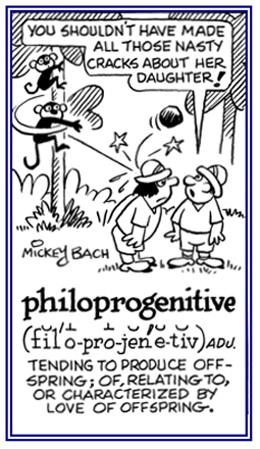philo-, phil-, -phile, -philia, -philic, -philous, -phily, -philiac, -philist, -philism
These are just a few of the meanings set up for the etymological meanings of philo- which comes to us from Greek.
In biology, there are many words that use philo-, phil- to mean "thriving in such and such a place or situation; or exhibiting a tendency for a specified condition" for its existence.
Other meanings include: "strongly attracted to; such as, an organism that loves or is strongly attracted to something which is specified".
In psychology and psychiatry, -phile, -philia, etc. use this element as a word termination indicating an abnormal craving or attraction to or an affinity for an object as shown by the word stems to which they are affixed.
philophobia
(s) (noun) (no pl)
The avoidance of falling in love or of being loved: Ron developed philophobia after being hurt by a close girlfriend when he cherished her and felt such a strong passion for her.
philophronesis
(s) (noun) (no pl)
The use of gentle speech or humble submission in order to mitigate, to calm, or to mollify anger: Tony was evidently good at philophronesis because he could assuage and soften the agitation and infuriation successfully between the neighbours.
philoplutary
(s) (noun), philoplutaries
(pl)
A fondness for or a special love for wealth: In one of Dickens' stories, the main character was greatly engrossed in philoplutary and often ignored his relatives.
philopolemic
(adjective), more philopolemic, most philopolemic
1. Concerning a fondness of controversy and dispute: James was philopolemic and always seemed to love bringing up arguments and discussions about topics that sometimes brought about a quarrel or a fight with other students.
2. Pertaining to the support of war; combative; warlike: As a philopolemic boy, Jack loved to watch movies with conflicting enemies fighting against each other and wanted to join the army when he was old enough.
philopolemicist
(s) (noun), philopolemicists
(pl)
A person who loves to argue or who is particularly fond of controversy: Somehow the new student in class was a philopolemicist who was especially inclined to disputing with the others in class.
philoponous
(adjective), more philoponous, most philoponous
Descriptive of the love of work; industrious: Mrs. Lawson was a dedicated teacher and was known for her philoponous commitment to instructing her students..
philopony
(s) (noun) (no pl)
A fondness for work: Peter had a strong work ethic and a predisposition to do the best in his job and put forth an effort to achieve his objectives. His employer said that he was lucky to have such an employee who had a good amount of philopony!
philoprogenitive
(adjective), more philoprogenitive, most philoprogenitive
1. Pertaining to being procreative, producing offspring; prolific: Judy’s
philoprogenitive cat gives birth to litters of kittens every year.
2. Related to loving one's own offspring or all children in general: Sally didn't have any children of her own, however as a
philoprogenitive aunt, she had her sister's children in her home as often as possible after school was over in the afternoon.
 © ALL rights are reserved.
© ALL rights are reserved.
Go to this Word A Day Revisited Index
so you can see more of Mickey Bach's cartoons.
philosemitism, philo-Semitism
(s) (noun) (no pl)
A fondness for or appreciation of Jewish people: Philosemitism pertains to the ideas, cultural qualities, history, etc. that originated with Jews. The opposite of philosemitism is antisemitism.
philosophaster
(s) (noun), philosophasters
(pl)
A person who pretends to know more about something than he or she actually knows as a way of impressing or manipulating others: A
philosophaster usually claims to have extensive learning about a subject, but that individual actually has only a superficial understanding of the topic.
Philosophaster is a Latin satirical comedy by Robert Burton, so since the play is about someone who pretends to be a philosopher. The term itself has been used in more recent times to refer to a pretender who supposedly has knowledge about philosophy.
<
philosophastering
(adjective), more philosophastering, most philosophastering
Referring to a person who acts like a philosopher: Martin wanted to impress his peers by commenting on theories by certain philosophers, but he was really only a philosophastering pretender.
philosophastry
(s) (noun), philosophastries
(pl)
A shallow or pseudo-philosophy: Joan read about philosophastry in one of her books on principles and doctrines as being a kind of spurious or pretended philosophy.
philosopher
(s) (noun), philosophers
(pl)
Anyone who studies and tries to explain the meanings of all kinds of issues that exist in the lives of people: A philosopher often makes efforts to present an extensive understanding about life, scholarly studies, and systems of convictions.
Philosophy in service to piety.
Motto of Hanover College, Hanover, Indiana, USA.
Philosophiae Doctor; Ph.D.
(s) (noun), Philosophiae Doctors
(pl)
Doctor of philosophy: Mr. Smith received his Ph.D., or the title of a
Philosophiae Doctor, after spending many years at the university, attaining a bachelor's degree with honours, a master's degree with a very high academic standing, and writing a thesis.
The average Ph.D. thesis is nothing but a transference of bones from one graveyard to another.
—J. Frank Dobie

You may take a self-scoring quiz over some of the words in this section by just clicking this
Philo Quiz #1 link.
Related "love, fondness" units:
agape-;
amat-;
vener-;
venus.



